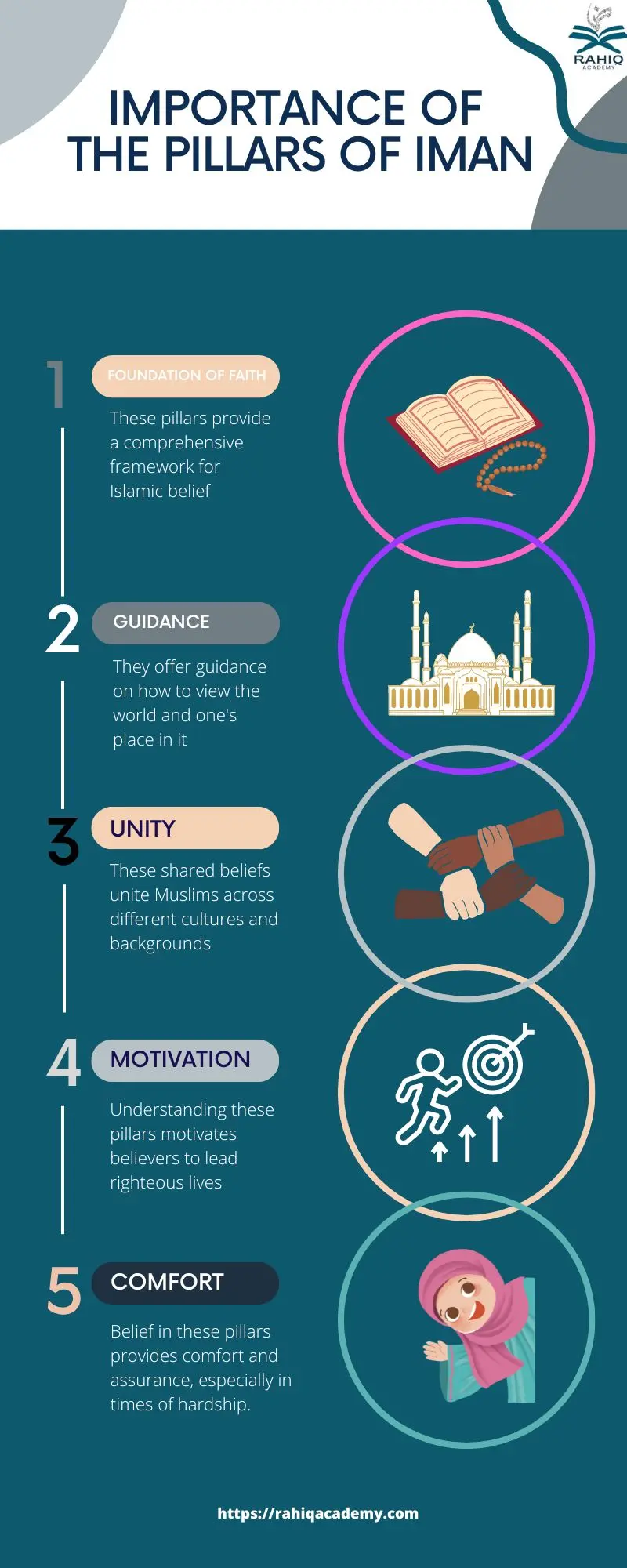The Pillars of Iman in Islam, also known as the Articles of Faith, form the foundation of a Muslim’s belief system. These pillars are derived from the famous Hadith of Jibril, where the angel Jibril (Gabriel) asked Prophet Muhammad (peace be upon him) about faith. The Prophet responded by outlining these essential beliefs
1. Belief in Allah (God)
Belief in Allah is the most fundamental pillar of faith in Islam. It involves believing in
– The existence of Allah as the One and Only God
– His unique attributes and names
– His absolute oneness (Tawheed)
Allah says in the Quran
“شَهِدَ اللَّهُ أَنَّهُ لَا إِلَٰهَ إِلَّا هُوَ وَالْمَلَائِكَةُ وَأُولُو الْعِلْمِ قَائِمًا بِالْقِسْطِ ۚ لَا إِلَٰهَ إِلَّا هُوَ الْعَزِيزُ الْحَكِيمُ”
“Allah witnesses that there is no deity except Him, and [so do] the angels and those of knowledge – [that He is] maintaining [creation] in justice. There is no deity except Him, the Exalted in Might, the Wise.” (Quran 3:18)
2. Belief in the Angels
Muslims believe in the angels as creations of Allah who:
– Are made from light
– Do not have free will and always obey Allah
– Have specific roles and duties
The Quran mentions
آمَنَ الرَّسُولُ بِمَا أُنزِلَ إِلَيْهِ مِن رَّبِّهِ وَالْمُؤْمِنُونَ ۚ كُلٌّ آمَنَ بِاللَّهِ وَمَلَائِكَتِهِ وَكُتُبِهِ وَرُسُلِهِ
“The Messenger has believed in what was revealed to him from his Lord, and [so have] the believers. All of them have believed in Allah and His angels and His books and His messengers.” (Quran 2:285)
3. Belief in the Divine Books
This pillar belief in the divine books involves believing in all the scriptures revealed by Allah, including:
– The Quran (revealed to Prophet Muhammad)
– The Torah (revealed to Prophet Musa/Moses)
– The Injeel (revealed to Prophet Isa/Jesus)
– The Zabur (revealed to Prophet Dawud/David)
4. Belief in the Messengers
Muslims belief in the Messengers sent by Allah, from Adam to Muhammad (peace be upon them all). This belief includes:
– Accepting that Muhammad is the final prophet
– Respecting and honoring all prophets without distinction
Allah states in the Quran:
قُولُوا آمَنَّا بِاللَّهِ وَمَا أُنزِلَ إِلَيْنَا وَمَا أُنزِلَ إِلَىٰ إِبْرَاهِيمَ وَإِسْمَاعِيلَ وَإِسْحَاقَ وَيَعْقُوبَ وَالْأَسْبَاطِ وَمَا أُوتِيَ مُوسَىٰ وَعِيسَىٰ وَمَا أُوتِيَ النَّبِيُّونَ مِن رَّبِّهِمْ لَا نُفَرِّقُ بَيْنَ أَحَدٍ مِّنْهُمْ وَنَحْنُ لَهُ مُسْلِمُونَ
“Say, [O believers], ‘We have believed in Allah and what has been revealed to us and what has been revealed to Abraham and Ishmael and Isaac and Jacob and the Descendants and what was given to Moses and Jesus and what was given to the prophets from their Lord. We make no distinction between any of them, and we are Muslims [in submission] to Him.'”
(Quran 2:136)
5. Belief in the Day of Judgment
This pillar belief in the day of judgment encompasses
– The belief in life after death
– The resurrection of all human beings
– Accountability for one’s deeds
– The existence of Paradise (Jannah) and Hell (Jahannam)
6. Belief in Divine Decree (Al-Qadar)
This final pillar in belief in divine decree volves believing that:
– Allah has knowledge of everything
– Everything that happens is by Allah’s will and decree
– Humans have free will and are responsible for their choices
The Prophet Muhammad (peace be upon him) said
الإِيمَانُ أَنْ تُؤْمِنَ بِاللَّهِ وَمَلاَئِكَتِهِ وَكُتُبِهِ وَرُسُلِهِ وَالْيَوْمِ الآخِرِ وَتُؤْمِنَ بِالْقَدَرِ خَيْرِهِ وَشَرِّهِ
“Faith is to believe in Allah, His angels, His books, His messengers, the Last Day, and to believe in divine destiny, both its good and its bad.”
(Sahih Muslim)
Importance of the Pillars of Iman

Importance of the Pillars of Iman include 5 points
- Foundation of Faith: These pillars provide a comprehensive framework for Islamic belief.
2. Guidance: They offer guidance on how to view the world and one’s place in it.
3. Unity: These shared beliefs unite Muslims across different cultures and backgrounds.
4. Motivation: Understanding these pillars motivates believers to lead righteous lives.
5. Comfort: Belief in these pillars provides comfort and assurance, especially in times of hardship.
The Six Pillars of Iman form the core of Islamic faith. They provide a comprehensive belief system that guides a Muslim’s understanding of God, the universe, and their purpose in life. By firmly believing in these pillars, a Muslim establishes a strong foundation for their faith and practice of Islam.
The Pillars of Iman in Islam: The Cornerstone of Faith
The Pillars of Iman in Islam constitute the bedrock upon which a Muslim’s faith is constructed. They provide a comprehensive framework for understanding the divine, the universe, and one’s place within it. By embracing these fundamental beliefs, Muslims find purpose, guidance, and solace in their lives.
Aqeeda, encompassing these pillars, is an integral part of Islamic knowledge. It is essential for every Muslim to have a firm grasp of their faith’s core principles. A strong foundation in Aqeeda empowers individuals to navigate life’s challenges with resilience and clarity.
To deepen your understanding of the Pillars of Iman and Aqeeda, we invite you to join our Aqeeda course at Rahiq Academy. Our dedicated scholars will guide you through these vital teachings, fostering a stronger connection with your faith.
Start this transformative journey of faith and knowledge. Enroll in our Aqeeda course today and discover the profound impact these pillars can have on your life.




